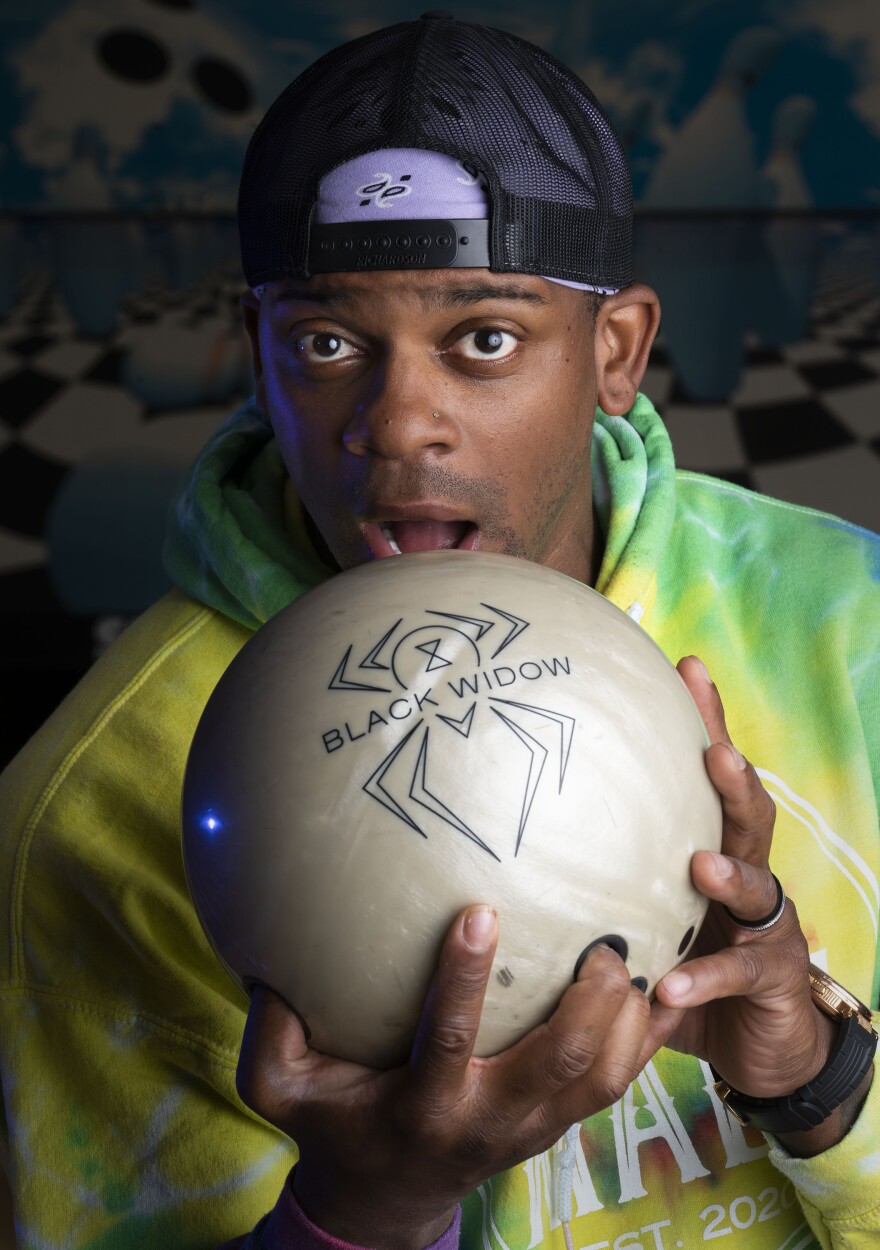This is part of a series of features from All Things Considered on first-time Grammy nominees, ahead of the April 3 awards. You can read and listen to profiles on Saweetie, Arooj Aftab and Barlow & Bear.
Amid the thunderous echo of pins colliding, Jimmie Allen unspools his professional ambitions.
He has already created his own production company, written a children's book and been the executive music producer for a Netflix show, but he wants to do a stint on Broadway as Aaron Burr. He wants to start his own clothing line. He wants to open a charter music school with a curriculum that doesn't revolve around testing. He wants to do a reality TV show with his wife. He wants to train as a WWE wrestler. And he has this idea for a sitcom.
"In my head, it's kind of about me moving from Delaware to Nashville," Allen says. "It's kind of like a comedy, and it plays on racial stereotypes a lot. It's pretty much saying what everybody is thinking, but afraid to say."
The 36-year-old country musician, nominated for Best New Artist at this year's Grammy Awards, is sitting down in Tusculum Strike & Spare in Nashville, Tenn. Over the last few years, he's become something of a regular, dropping by several times a week for a few hours with his kids, or the friends he conscripted into a bowling league. "It's cool here to just hang out and be around real people," he says.
For Allen, bowling is a break from music: Both his own work and Nashville's social scene of striving artists, which he admits he finds frustrating.
"I would just meet other people that wanted to be artists that were just mad that nothing was happening, but yet they weren't doing anything to make anything happen, either," he says. "They would just go get drunk at night, work during the day, go get drunk — so you don't want it."
Even at bowling, Allen puts in the work. He says his average has jumped steadily: 110 to 125 to 130, 160 after joining a few leagues, now around 190.

"Once I start something, I get obsessed with it to where I want to get better," he says. "I'm super competitive."
Turns out, so is his 7-year-old son, who loves bowling even if his dad won't let him put up the bumpers like other kids.
"Ain't no bumpers in life," Allen says. Instead, he's been teaching his son that if you don't want your bowl to end up in the gutter, you have to put in the work and learn to control where the ball goes.
It's easy to trace Allen's competitive nature and self-assuredness to the influence of his parents, who he says "never hit me with the whole, 'Well, you should have a backup plan.'" The Allen household didn't believe in them.
"I told my mom when I was 5 years old I was going to be an entertainer," he says. "And she said, 'Yeah, you will.'"
Even if Allen's professional ambitions stretch across film, television and theatre, music has always come first. "The goal was to do music and then, the older you get, you figure out who you are," he says.
Who Allen is — his solid work ethic, his straightforward demeanor, his desire for something real — has been irrevocably shaped by his hometown of Milton, Del., which he calls "a little redneck town," the kind of place surrounded by chicken plants and soybean fields, where people pick up their groceries directly from the farm. You can imagine how radio has the power to transform the many hours spent driving from one isolated locale to another from quotidian activity into a pastime.
Allen says less than a thousand people lived in Milton in the '90s when he was growing up and "everybody listened to country music," including his father. He remembers getting in trouble for repeatedly changing the radio station in his father's truck every time the latter got out to buy cigarettes.
"Country music's all my father listened to," he says. "Nothing else."
Allen was exposed to other genres at school, where kids played music from their Walkmans and he taught himself the vocal styles of Christian music, R&B, rock and the blues. As he got older, he says he "continued to fall in love with other genres of music but then I realized, OK, for me and who I am as a person, a country music world is for me."
He talks about genres of music as their own languages, with unique storytelling histories and idioms. For Allen, country's lyricism — its emphasis on family and small town life, with songs about drinking and songs about the freedom of an open road — was the language that best expressed his own life and experiences.
When he sings about rolling out to his "favorite fishin' hole" in "Get Country," he can name the spot — the Moose Lodge, where they'll make him a specialty "Jimmie burger" (two patties with cheese, ketchup and Miracle Whip on each, and an egg over easy in the middle, with lettuce and extra raw onions). And he does name the spot in "Home Sweet Hometown," an ode to Milton in which he lovingly describes its "handful of red lights down main" with its "courthouse clock not tickin'", and he name checks real convenience store Quick Stop, where "the same old lady" makes his breakfast favorites.
"Everything that I write, I somehow tie it back into who I am and how I grew up," he says.

Allen is coming off a banner year: He won both New Artist of the Year at the Country Music Association Awards (CMAs) and New Male Artist of the Year at the Academy of Country Music (ACM) Awards, the latter of which he hosted this year alongside Dolly Parton and Gabby Barrett. He released his sophomore album, Bettie James Gold Edition, and toured with Brad Paisley.
But Allen remembers his early years in Nashville when he'd play showcases for unsigned artists and watch other people who performed at half his level walk away with a deal at the end of the night.
"I had this one guy tell me straight up, he was like, 'Jimmie, I like you, but I'm not sure how someone that looks like you will go over well in country music,'" he says. "And I'm like, 'Bro, you got Charley Pride!'"
He says at the time, Pride was the only Black country artist working at a national level, the exception that proved the rule in the minds of industry gatekeepers. "It pisses me off just the way he said it," Allen says.
"A lot of people still think that if you're a Black person, you shouldn't wear a certain thing or sing a certain type of music because it might not be appealing to the white listener," he says, "Even though white artists wear the same thing and they've said nothing to them."
It can be exhausting to justify your existence in a place where you belong, and Allen is candid about still fielding not-so-subtle questions about what exactly a Black man is doing in country music 15 years on. His strategy? Staring interviewers down until they either rephrase the question or move on. This is not a man who loses a game of chicken. But in 2022, there are now too many exceptions — artists like Mickey Guyton, Kane Brown, Darius Rucker, Blanco Brown, Breland, Willie Jones and Reyna Roberts — to prove the rule that country music can't be a Black artist's game. And the sound and scope of commercial country itself is changing to keep up, with slicker production and sonic elements like hi-hats and stuttering beat drops that nod to hip-hop's new reign as the dominant genre in the U.S.
Ultimately, Allen, who has songs with artists like Babyface, Nelly and Pitbull alongside country mainstays Keith Urban and Tim McGraw on his album, isn't interested in splitting hairs about genre. "What makes a country artist a country artist? It ain't about how many fiddles and mandolins you got in your song," he says. "It's that you're a country woman or country boy."
Allen built his career through the apparatus of the country music industry, and hopes that others who look like him will see his success and know that they can do it, too.
"I tell people all the time: Come on over to country music. There's Black people in the industry over here at record labels, radio promotion, marketing, management," he says. "We get more people of color over here by more people of color coming."
Allen sincerely believes that country is "a genre of music that is for everyone," and although it shouldn't be his responsibility to change anyone's mind, his success and nomination as a the only country artist in a general music Grammy category might help tear some stuffing out of the strawman of the white country listener.
"Music is the best thing to expand your brain and help you learn to accept that people are different, that things are different, and what you might be afraid of because it's different might actually be something you might love," he says.

There's still so much Allen wants to do, with his aspirational list of collaborators stretching far beyond the gates of Nashville. His heart, after all, has always belonged a little closer to home.
You can leave your hometown, but it never leaves you. For Allen, music may be a universal language that transcends backgrounds, but country music has its own private magic.
"I wish I could go back to those days, when the town was the whole world," he sings on the rose-tinted single "Freedom Was A Highway."
In that song's music video, Allen finds a glowing guitar on the side of a wooded road; he uses it to breathe a band into existence and reminisce about the youthful opportunism of his teenage years in Milton.
"When you're seventeen and drivin', you don't think about the road runnin' out," he sings.
Allen's road in Nashville is a long way from running out, but what they don't tell you when you spend your youth dreaming of the road that takes you away is that the highway runs both ways. One day when all those small town memories are golden, a song will have the power to take you home.
The audio for this story was produced by Jonaki Mehta and edited by Christopher Intagliata. The article was written by Cyrena Touros.
Copyright 2023 NPR. To see more, visit https://www.npr.org.








